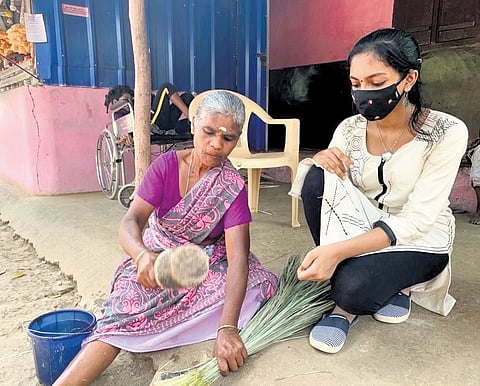

BENGALURU: While India marches towards technological advancement and modernization, there exists a poignant contrast, a silent struggle faced by those who are unable to cope with the dynamic changes of the new world. Tribal colonies in Karnataka and Kerala are caught in a delicate balance between tradition and the adoption of modernity. But they say that every drop in the ocean counts and as Mahatma Gandhi foretold, “In a gentle way, you can shake the world.” Niharika Nair, a grade 11 student, has set out to create awareness and highlight the despair of unrecognised tribal colonies.
Pursuing her studies at Ekya Schools in Bengaluru, 17-year-old Niharika is addressing the unnoticed human rights violations with her unique approach through the project ‘Tribali.’ So far she has impacted over a thousand families, helped them in securing essential documents, organised health camps, and promoted sustainable initiatives.
Speaking to TNSE, on her several visits to the hamlets she said, “They face a lot of eviction from land. Land mafia, forest mafia and deforestation are not uncommon. The laws of the government changed their method of cultivation and lifestyle too.”
Niharika highlights that the most affected groups are the ones living deep in the forest and those in hilly areas. They need the government to provide amicable conditions to survive along with education and health care. She adds that they endure a minimum of six daily human rights violations.
Project Tribali
Niharika’s project focuses on income generation, cultural preservation and accessing basic fundamental rights for the community. She has been working on this project since Grade 8 and recently presented Tribali at the 7th 1M1B (1 Million for 1 Billion) Active Youth Summit along with the Department of Global Communications, UN. 1M1B engages and enables youth to become future-ready problem solvers creating real-world impact.
So far, Niharika has created an impact by registering the tribal families (1,200 individuals) for Aadhar cards so that they can avail government schemes. She has also organised fundraisers and raised about Rs 40,000 to donate to families in need.
Making a very interesting point on the nutrition of tribal folks Niharika says, “Multiple deaths occur as the nutrition they receive is low, the ration kits only distribute grains. Though newborn babies are taken to the hospital, their mortality rate is low. Malnutrition in Vanavasi (tribal) children is worrisome,” she adds.
Tribali has donated solar cookers to hamlets so that they can cook nutritious food and trained them in making artefacts to sustain their livelihoods. Niharika says she has successfully sold handicrafts worth Rs 10,000 in Bengaluru.
Despite their primitive lifestyle, Niharika recalled one of her experiences with tribals, saying they live sustainably and we could learn a lot from them. “They use windmills as a source of energy. The community is well-versed in understanding plants and their medicinal properties. When I visited one of the hamlets they showed me a 300 page book that has information on herbs and plants written in Malayalam,” she added.
Creating hamlet awareness
From here on, Niharika’s efforts are to create more awareness about these hamlets and to hold an event, showcasing the talents of the marginalised community. Eventually, she wants to build a virtual simulation where one can firsthand experience different cultures and traditions.
Highlighting other challenges faced, Niharika says even though the state governments set aside a handsome amount in each budget, due to the corruption at various levels the development is slow. The biggest problem is also their lack of motivation.
“The tribal students have many schools but lack the motivation to go and study. Some have land but don’t use it because they either don’t know about the new methods of agriculture or have forgotten whatever their forefathers did. They are skilled in fishing and enjoy painting and drawing. These children should be encouraged to pursue a formal education,” Niharika concludes.
Work with different tribal settlements:
● Nakkupathi Tribal Hamlet, Attapadi
● Anakkal Adivasi Colony, Malampuzha
● Soliga Tribal Hamlet, Gundlupet
● Vadyarchalla Adivasi Colony, Walayar
● Kodava Settlement, Coorg
● Malasa Tribal Colony, Chittur
● Keerehadi N Bilattaru Village, Kabini